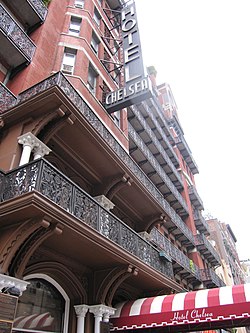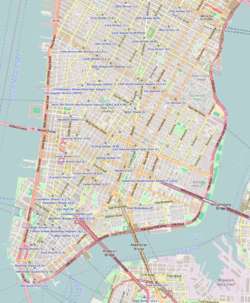The Hotel Chelsea
|
Hotel Chelsea
|
|

Close-up of the facade, showing the cast iron balconies
|
|
| Location | 222 West 23rd Street, Chelsea, Manhattan, New York City |
|---|---|
| Coordinates | Coordinates: 40°44′40″N 73°59′48″W / 40.74444°N 73.99667°W |
| Area | Less than one acre |
| Built | 1884 |
| Architect | Hubert, Pirsson and Company |
| Architectural style | Queen Anne Revival, Victorian Gothic |
| NRHP Reference # | 77000958 |
| Significant dates | |
| Added to NRHP | December 27, 1977 |
| Designated NYCL | March 15, 1966 |
The Hotel Chelsea – also called the Chelsea Hotel, or simply the Chelsea – is a historic New York City hotel and landmark built between 1883 and 1885, known primarily for the notability of its residents over the years. The 250-unit hotel is located at 222 West 23rd Street, between Seventh and Eighth Avenues, in the neighborhood of Chelsea, Manhattan. The building has been a designated New York City landmark since 1966, and on the National Register of Historic Places since 1977.
It has been the home of numerous writers, musicians, artists and actors. Though the Chelsea no longer accepts new long-term residencies, the building is still home to many who lived there before the change in policy. As of August 1, 2011, the hotel is closed for renovations.Arthur C. Clarke wrote 2001: A Space Odyssey while staying at the Chelsea, and poets Allen Ginsberg and Gregory Corso chose it as a place for philosophical and artistic exchange. It is also known as the place where the writer Dylan Thomas was staying when he died of pneumonia on November 9, 1953, and where Nancy Spungen, girlfriend of Sid Vicious of the Sex Pistols, was found stabbed to death on October 12, 1978. Arthur Miller has written a short piece, "The Chelsea Affect", describing life at Hotel Chelsea in the early 1960s.
Built between 1884 and 1885 and opened for initial occupation in 1884, the twelve-story red-brick building that is now the Hotel Chelsea was one of the city's first private apartment cooperatives. It was designed by Philip Hubert of the firm of Hubert, Pirrson & Company in a style that has been described variously as Queen Anne Revival and Victorian Gothic. Among its distinctive features are the delicate, flower-ornamented iron balconies on its facade, which were constructed by J.B. and J.M. Cornell and its grand staircase, which extends upward twelve floors. Generally, this staircase is only accessible to registered guests, although the hotel does offer monthly tours to others. At the time of its construction, the building was the tallest in New York.
...
Wikipedia




